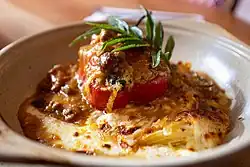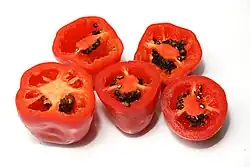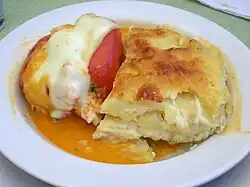Rocoto relleno
Rocoto relleno is the Peruvian variety of stuffed peppers, a dish popular in the city of Arequipa, a city in the Andes mountains located in the southern parts of Peru which is famous for its take on dishes derived originally from Spain. Since the sweet peppers used in Spain were not available in Peru, rocoto peppers were substituted, which were cooked in water and vinegar to remove as much spiciness as possible. Minced meat is placed inside the rocotos and is then topped with melted cheese, baked and served whole. Rocotos are capsicum pubescens which are at least ten times spicier than jalapeño when raw. This is considered one of the most famous dishes of Peru and served all over the world.[1][2]



Characteristics
This dish takes a while to prepare. The dish is only mildly spicy and the stuffing inside the rocoto can include anything. The most popular stuffing is a beef-mix which contains beef, pork, onions, garlics, margarine (butter) cream and pecans. Putting a hard-boiled egg inside the rocoto is also very popular way to serve.
Ingredients
Rocotos, red vinegar, chopped beef, chopped pork, olive oil, tomato sauce, white wine, cream, pecans, beef stock, aji panca paste, potatoes, red onion, garlic, margarine, flour, mozzarella cheese, parmesan cheese.
.JPG.webp)
Preparation
The rocoto relleno is generally prepared by stuffing the rocotos with an ideal beef-mix and then topped with cheese. Then it is put inside the oven with tomato sauce and served whole with baked potatoes or salad.
Preparation of the rocotos: First the upper parts of the rocotos are cut off and seeds are removed. The rocotos are then cooked in water with salt and vinegar to get the worst of the heat out.
Preparation of the stuffing: Chopped beef and pork are mixed with a seasoning made of margarine, ground garlic, onion, and aji panca paste. The beef-mix is then mixed with pecans, flour, stock and cream and then fried in olive oil with tomato sauce and wine.
History
The Incas prized the rocoto for its special flavor and cultivated it around 1.500 to 2.900 meters above sea level. This dish was the most common way to prepare rocoto.[3]
References
- "National Geographic's top 10 things to eat in Peru". Retrieved 2013-04-30.
- "Go Andes: Peru Holiday Experts". Archived from the original on 2013-07-22. Retrieved 2013-04-30.
- National Research Council (1989). Lost Crops of the Inca's (1st ed.). Washington, D.C.: National Academy Press. pp. 196–197.
External links
 Media related to Rocoto relleno at Wikimedia Commons
Media related to Rocoto relleno at Wikimedia Commons